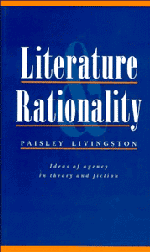2 - Agency, rationality, and literary knowledge
from I - THEORIES AND QUESTIONS
Published online by Cambridge University Press: 16 October 2009
Summary
Having surveyed a number of questions related to the notion of rationality, I turn now to the issue of their pertinence to literature, my primary goal being to identify a number of distinct avenues of literary-critical enquiry. Clarifying the basic orientations and assumptions of several different approaches to literary phenomena will make it possible to define the particular aims of the analyses presented in the rest of this study, as well as to identify topics for future research.
The question of the relation between concepts of rationality and ‘literature’ is complicated by the vagueness of the latter term. Literary scholars have never been able to agree over the boundaries of their object domain, which remains extremely open-ended, embracing whatever items a variety of traditions happen to have preserved under the rubric of ‘literature’. The term evokes any number of multi-faceted items as well as a broad range of phenomena that are in one way or another thought to be significantly related to them. As a result, the literary field is an ontological auberge espagnole, for it houses past and present agents, actions, and events, mental states and attitudes, types of physical artefacts, institutions and conventions, symbolic inscriptions and utterances – as well as the aesthetic qualities of any of the above. It is not uncommon for literary critics to debate over angels, demons, and vampires.
- Type
- Chapter
- Information
- Literature and RationalityIdeas of Agency in Theory and Fiction, pp. 48 - 86Publisher: Cambridge University PressPrint publication year: 1991



